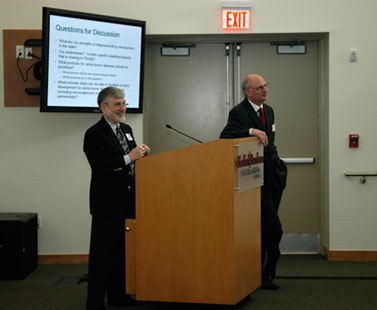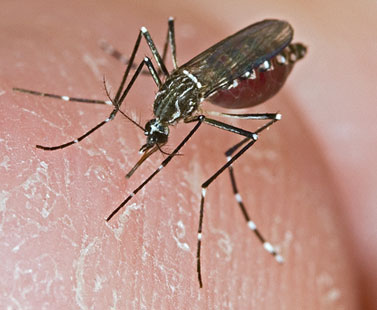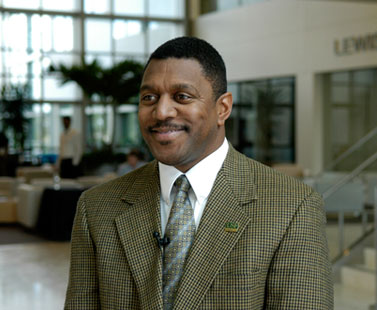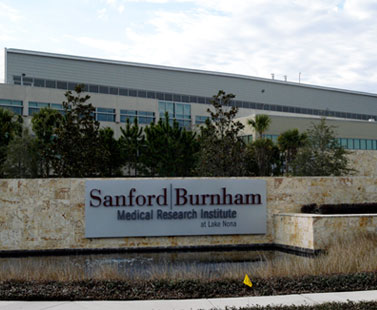USF, UF hope to combat mosquito-borne diseases by joining Florida universities, private industry
Project’s long-term goal is to create new drugs for vector-borne diseases and get them to consumers faster, while tapping into economic opportunities
If you think tropical diseases like malaria are no cause for concern in the United States, think again.
In October a Jacksonville woman contracted malaria, despite not having traveled out of the country in a decade. Cases of dengue fever began appearing among tourists and residents in Key West in 2009 and continue to increase — the first reported dengue outbreaks since 1934. Health officials worry that more global travel, urbanization and changing climates mean mosquito-borne, once-tropical diseases such as dengue and West Nile virus are not only here to stay, but may be spreading.
To reduce Florida’s susceptibility to these emerging and re-emerging vector-borne diseases, researchers from the University of South Florida and the University of Florida want to create new drugs to combat vector-borne diseases and get those drugs to consumers faster. Last year, the two institutions were awarded a half a million dollars from the state’s Board of Governors to spur research in this area of drug discovery. The project is part of the New Florida Initiative, a program geared toward diversifying the state economy by funding innovation on university campuses. It is modeled after the Food and Drug Administration’s Critical Path Initiative, which provides guidelines for a fast track approach to help bring new treatments to market – everything from drug discovery and design, preclinical research in laboratory and animal models to clinical trials and FDA approval, to large-scale manufacture of a drug for sale.
Recently investigators from USF and UF as well as other state universities met with partners from biotechnology and pharmaceutical firms across Florida, and public health officials, to discuss how to better move new-line drugs and other therapies from the early research stages to the market. The conference, “Optimizing Detection, Prevention and Treatment of Vector-Borne Disease,” held Jan. 31 at the Sanford-Burham medical Research Institute, Lake Nona in Orlando, included presentations about malaria, dengue, equine encephalitis, West Nile virus and other pathogen-related diseases that Florida residents are somewhat at risk of contracting.

Dr. Glenn Morris (left), director of the UF Emerging Pathogens Insitute, and Dr. Wil Milhous, associate dean for research at the USF College of Public Health, moderated the discussion on building public-private partnerships to advance drug development.
“These vector-borne diseases are very complex. To solve the problems, you frequently have to bring researchers outside their normal comfort zones,” said J. Glenn Morris, MD, MPH&TM, director of the UF Emerging Pathogens Institute. “That means bringing together people from multiple universities who can look at the problem from different perspectives, as well as people from industry and government. Together, we can think about ways to take each of our pieces and integrate them into a whole that results in something meaningful – like the ability to effectively manage a disease like dengue fever.”
Scripps Florida, the Vaccine and Gene Therapy Institute, Nanotherapeutics and United Therapeutics were among the firms represented at the conference, the first of several to be held this year.
“To be successful in translating research into a commercially viable product, it’s very important for researchers in academic medicine to get to know and collaborate with those in industry who can help guide us in the drug discovery and development process,” said Wilbur Milhous, PhD, associate dean for research at the USF College of Public Health, who has contracted both malaria and dengue fever during his 28-year career developing antimalarial drugs. “Equally important, those in private industry need to appreciate the academic expertise available at the various colleges and schools in Florida.”
Among the conference speakers was Bill J. Baker, PhD, a USF chemistry professor and new director of the USF Center for Drug Discovery and Innovation. Umbrella organizations are needed in the state to more efficiently fight illness, and this conference was a first step in organizing people, databases and shared resources,” Dr. Baker said. “We can make sure people are talking across the state, focused on the same diseases.”

For the last four years, Dr. Baker has worked with Dennis Kyle, PhD, professor of global health at the USF College of Public Health. They’ve focused on isolating and testing chemical compounds derived from the natural world – plants, fungi and microbes – that may act against parasitic diseases like malaria. The compounds have been discovered within the biodiverse resources collected on Dr. Baker’s many research expeditions to Antarctica. Tapping into faster new technologies and procedures, such as mass spectrometry studies and magnetic resonance spectroscopy, the collaboration holds the promise of tapping the vast potential of ocean floors, glaciers and other marine environments.
“Nature is an excellent place to look for potential new drugs, especially marine environments, which have tended to be underexplored,” Dr. Baker said. “The NIH’s (translational research) model of bench to bedside really needs to incorporate the concept of the environment, including beach to bedside.”
Barriers to getting more drugs for vector-borne diseases into the drug development pipeline include lack of economic incentive for pharmaceutical companies to invest in rare and neglected diseases, often with poorly defined markets in underdeveloped countries.
But, USF’s Dr. Kyle, who oversees teams that have attracted research funding from the National Institute of Allergy and Infectious Diseases, the Bill and Melinda Gates Foundation and Medicines for Malaria Venture, told attendees that “you don’t necessarily need big pharma involved to be successful” in moving promising drug candidates into the pipeline.
The key, he said, is public-private partnerships that pull together the “right construct” of people and resources. For instance, he said, that may mean creating an entrepreneurial academic team with expertise in biology, chemistry, pharmacology, toxicology and other disciplines, which works well with scientists and engineers from smaller pharmaceutical or biotechnology companies. The state’s universities often conduct field research in locations where mosquito-borne diseases are endemic, providing an opportunity for testing promising drugs.

Dr. Kevin Sneed, dean of the new USF College of Pharmacy, says the college will work with other institution across the state to develop a curriculum that addresses emerging and infectious diseases.
Other USF speakers were Thomas Unnasch, PhD, professor of global health, and Kevin Sneed, PharmD, founding dean of the USF College of Pharmacy.
Dr. Unnasch shared his expertise on Eastern equine encephalitis, a rare but disabling and potentially deadly mosquito-borne disease that is reported more frequently in Florida than all other states combined. Surveillance is often relied upon detect mosquito-borne diseases and control their transmission, Dr. Unnasch said. “Unfortunately using surveillance strategies to try to knock down mosquito populations is a sledgehammer approach… we could likely do better with new prevention and treatment approaches.”
Dr. Sneed said that USF’s new College of Pharmacy will cultivate student and faculty interest in global health and work with other state’s colleges and schools to develop an interdisciplinary curriculum that addresses emerging and neglected infectious diseases.
Near the close of the conference hosted by USF and UF, the attendees brainstormed about the Florida’s strengths and weaknesses in diagnostics and drug development for vector-borne diseases. They also began prioritizing their disease focus and defining what next steps are needed to encourage drug development, including public-private partnerships that might advance economic opportunities.

The first conference was held at the Sanford Burham Medical Research Institute, an anchor facility at Lake Nona, Orlando.
– Video by Amy Mariani; story and photos by Anne DeLotto Baier, USF Health Communications
– Mosquito photo courtesy of University of Florida Emerging Pathogens Institute

